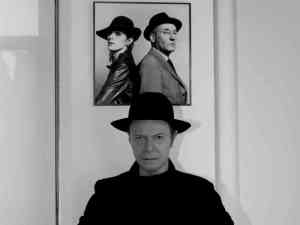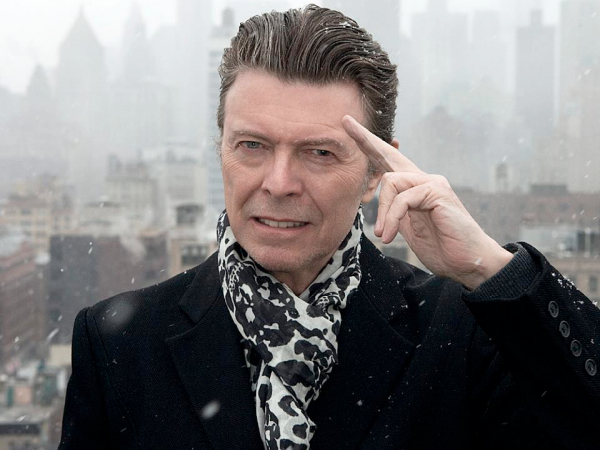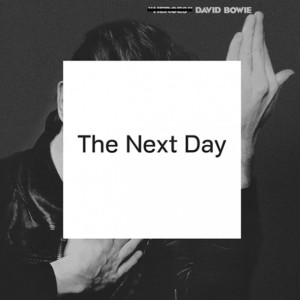Read our David Bowie obituary here.
There’s a new Bowie album out which is a rare occurrence these days: the last time any new Bowie came out was 2003’s Reality and the last time new-to-you Bowie came out was 2010’s bloated Station to Station box set (three LPs! Five CDs! And a DVD 5.1 mix of the album!). So it’s been a long time coming.
Predictably, this is being treated as A Big Event. Over at Pitchfork, their review walks a line between homage and respect, with a nice framing device about a mask worn by Bowie on a NME cover, but doesn’t seem to get to the album itself until near the halfway point (watch as I fall into the same trap). And at Grantland, Chuck Klosterman wrote an obit for Bowie that’s seems more about how smart Klosterman thinks he is than Bowie.
I think the problem with Bowie and his legacy lies somewhere in-between these two. He mattered once and he mattered a hell of a lot. He adopted roles, made some good rock music and hung around with some of the best musicians of his time. But that was a long, long time ago. Just because Bowie mattered once shouldn’t mean that you need blinders when thinking about the man.
The easiest line about Bowie is that he hasn’t had a good album since Scary Monsters (and Super Creeps). It’s easy because it’s true: after Monsters, Bowie moved towards a more crowd-pleasing style of pop rock and started recording with Mick Jagger and Stevie Ray Vaughan. Then he decided to be one of the boys with Tin Machine. Later, he recorded a bunch of songs about a bad computer game and joined forces with Tony Visconti again.
In the over 30 years since Monsters, how many great songs has he had? “Let’s Dance”, sure and I’ll give you “Cat People”. From there, it’s a bit of a slog: his cover of “China Girl” is sterile imitation, “Absolute Beginners” is a half-baked ballad and “Jump They Say” sounds like someone who’s being told to try and sound like Bowie. For a song about someone who’s schizophrenic, it’s remarkably tame-sounding; you’d think there’d be some element of danger to the recording.
 That danger is what’s missing from his music of the past 30 years. In the 70s, Bowie lived hard: it’s said he lived on cocaine and red peppers while recording Station to Station; one of the best moments on “Heroes” is the song about alcoholic blackouts. Even earlier, his best music was about death and decay. Things ended badly for Ziggy Stardust (“when the kids had killed a man…” to say nothing of Rock and Roll Suicide, about as blunt a statement as Bowie ever made) and Diamond Dogs is a post-apocalyptic nightmare nobody wants to live in. And when he sang about nicer things… well, nobody’s favorite Bowie album is Pin Ups.
That danger is what’s missing from his music of the past 30 years. In the 70s, Bowie lived hard: it’s said he lived on cocaine and red peppers while recording Station to Station; one of the best moments on “Heroes” is the song about alcoholic blackouts. Even earlier, his best music was about death and decay. Things ended badly for Ziggy Stardust (“when the kids had killed a man…” to say nothing of Rock and Roll Suicide, about as blunt a statement as Bowie ever made) and Diamond Dogs is a post-apocalyptic nightmare nobody wants to live in. And when he sang about nicer things… well, nobody’s favorite Bowie album is Pin Ups.
The other thing is who he surrounds himself with. Lester Bangs was as hard on Bowie as anyone and rightly pointed out how Bowie’s music reflected who he was hanging around with, or at least listening to. When he rocked out, he had Mick Ronson’s crunchy Les Paul with him on stage and Lou Reed hanging around backstage. When he decamped to Berlin he recorded with Eno and listened to a lot of Kraftwerk. His high-water marks had some of the best guitarists of the 70s: Robert Fripp, Carlos Alomar, Earl Slick. He always did his best work when he was pushed by the best. And it’s Slick’s involvement on parts of The Next Day which has me most interested in his new album.
Mostly, I’m only just interested. I’ve only given the album a cursory listen and honestly, it hasn’t done much for me. The video for “The Stars (Are Out Tonight)” takes fucking forever for anything to happen and once it does, it sounds remarkably restrained by his standards. The guitars seem quieter, the band kept at a distance. It’s not bad, but it’s more Queen Nuisance than Queen Bitch.
 I feel like Bowie’s settled into older man mode, which is fair for someone of his age. He’s 66 and had a serious heart attack. He’s got a kid at home. Nobody in their right mind should be expecting him to record another Scary Monsters. I wouldn’t blame him for not wanting to be in the same room as danger anymore.
I feel like Bowie’s settled into older man mode, which is fair for someone of his age. He’s 66 and had a serious heart attack. He’s got a kid at home. Nobody in their right mind should be expecting him to record another Scary Monsters. I wouldn’t blame him for not wanting to be in the same room as danger anymore.
Instead of trying to stay relevant, Bowie’s new music is more about his past. After all, he’s being chased by his Station To Station-era self in the video for The Stars. That’s admirable in an era where Areosmith is pumping out new material to an audience only interested in their name or the Hendrix estate selling scraps of scraps. So he split the difference between what we expect and what we should expect: it’s not him at his peak, but him trading on his peak. For once, he’s finally looking back, but in a way that makes us think about his past, not just re-remember it.
Bowie, to his eternal credit, doesn’t have the desire to repeat himself all that much. It means when he does, it’s an interesting listen but it also means he’ll never record the album the critics want. He records the music he’s interested in at the moment and when the moment’s done, he goes on to the next. Right now, he’s interested in what his legacy will be. Who knows what’ll interest him in two years; a song cycle about Downton Abbey perhaps?
Thus the question will never stop being asked: is this album his best since Scary Monsters? And the answer will always be the same. Does it matter?



